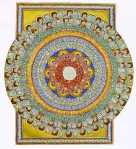International Conference: Medieval Texts in Transit: Continuities and Shared Spaces
21–22 July 2017
Free University Berlin, in collaboration with the Sonderforschungsbereich 980, ‘Episteme in Bewegung’, Berlin, and the Centre for Medieval Literature, University of Southern Denmark (Odense)/University of York.
Do we overestimate the impact that the transient socio-political and formal linguistic borders of Western Europe had on the literary culture of the pre-nation state era?
While most current scholarship acknowledges the porous borders of medieval Europe, we continue to think in the context of linguistic and political borders when considering the circulation of texts, using national language categories and political ‘landmarks’ as fixed points by which to structure our understanding of how medieval texts were disseminated. This conference invites scholars to re-examine such discourses of separation, and consider the case for continuity in the language, content or imagery of medieval texts and stories that were adapted and refashioned in different regions.
Papers may engage with any of the following issues and questions:
– the creation of meta-regional reading communities or literary spaces shared by courts and other cultural hubs such as scriptoria and monasteries, which illustrate the ways in which the concept of reading communities can be detached from assumptions about shared linguistic or regional origins.
– examples of story transmission, such as lost manuscript versions and orally transmitted tales, that function outside the chronologically and geographically localized benchmarks of extant manuscript contexts.
– theoretical and/or comparative approaches to the circulation of stories that question the notions of separation and difference behind conventional distinctions such as core/periphery and source/derivation.
– can the notion of ‘proximity’ be extended beyond geographical proximity, to include cultural and linguistic similarity (such as dialects that are mutually intelligible, or texts written in a lingua franca), as well as the sharing and reading of the same texts in similar ways in geographically disparate places?
– how might evidence from material culture (e.g. caskets, frescoes, sculpture) prompt a reassessment of traditional text-centric approaches to the circulation of stories and ideas?
Please send an abstract of no more than 250 words for a 20–30 minute paper to Dr. Miriam Edlich-Muth (Free University Berlin) and Dr. Alastair Matthews (University of Southern Denmark), at by 30 September 2016.
Email: textsintransit@gmx.com
Conference organisers hope to be able to contribute to travel and accommodation costs for speakers without access to other financial support. Publication of papers in an open-access volume is planned.

